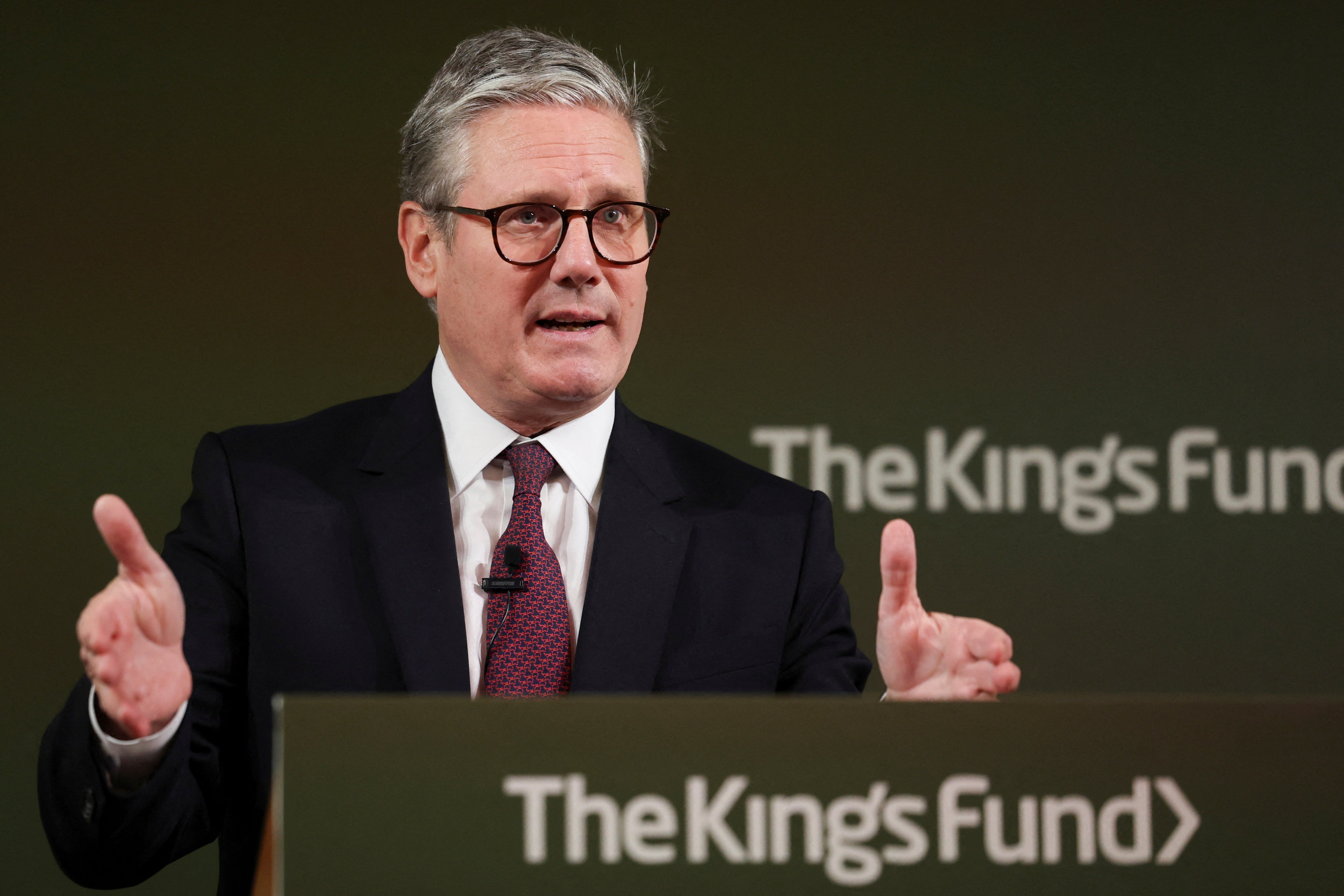Keir Starmer takes on ‘broken’ NHS and warns: no more money without reforms
‘We have to fix the plumbing before we turn on the taps’ says PM
Your support helps us to tell the story
From reproductive rights to climate change to Big Tech, The Independent is on the ground when the story is developing. Whether it's investigating the financials of Elon Musk's pro-Trump PAC or producing our latest documentary, 'The A Word', which shines a light on the American women fighting for reproductive rights, we know how important it is to parse out the facts from the messaging.
At such a critical moment in US history, we need reporters on the ground. Your donation allows us to keep sending journalists to speak to both sides of the story.
The Independent is trusted by Americans across the entire political spectrum. And unlike many other quality news outlets, we choose not to lock Americans out of our reporting and analysis with paywalls. We believe quality journalism should be available to everyone, paid for by those who can afford it.
Your support makes all the difference.Sir Keir Starmer has vowed to “take on” any opposition to radical changes in the NHS, saying difficult and unpopular changes are needed before it receives a penny more from the government.
The prime minister said the health service required “major surgery, not sticking plasters” and that fixing it could take a decade or more.
Risking anger from unions, he said he was not prepared to spend more money while the system was paying huge sums to agency workers, adding: “We have to fix the plumbing before we turn on the taps.”
“I’m not prepared to see even more of your money spent on agency staff who cost £5,000 a shift, on appointment letters which arrive after the appointment, or on paying for people to be stuck in hospital just because they can’t get the care they need in the community,” he said.
As he was speaking, ministers announced a clampdown on junk food advertising in a bid to cut obesity rates and reduce the burden on the NHS. From October next year, online adverts will be banned altogether while TV ads will be shown only after the 9pm watershed.

But critics questioned how far Labour was prepared to go. Former Tory health minister Lord Bethell told The Independent: “You cannot be serious about prevention and rule out a sugar tax on the same day.”
Sir Keir’s comments, in a speech to the King’s Fund think tank, following a damning independent review that found the NHS in “critical condition” with some of the worst cancer survival rates in the Western world.
Completed in nine weeks by Ara Darzi, a surgeon and an independent peer, it blamed choices made by the last Conservative government and warned the health service would take years to fix.
Government sources denied the reforms would mean more privatisation, saying the Darzi report was clear about the amount of money the NHS is currently spending badly and in the wrong places.

Health secretary Wes Streeting has previously announced plans to use the private sector to help cut NHS backlogs, and hit out at “middle-class lefties” who oppose the move, saying they risk putting ideological purity ahead of patient care.
Earlier on Thursday, Mr Streeting said the doctors’ union, the British Medical Association (BMA), should stop “sabre-rattling” and work with ministers.
An “unnecessary threat” of action from the organisation’s GPs “would harm patients”, he said.
Leading scientist Professor Sir John Bell also hit out at doctors in the BMA, saying they had “been a major drag on reform of healthcare”.
Setting out a broad vision for reform, Sir Keir said his 10-year plan would include changing the NHS to a “neighbourhood health service”.
This would mean “more tests, scans, healthcare offered on high streets and town centres, improved GP access, bringing back the family doctor, offering digital consultations for those that want them, virtual wards and more patients safely looked after in their own homes where we can deal with problems early before they are off work sick and before they need to go to hospital”.
He also pledged to drive up productivity in hospitals, giving them more of a role in preventing sickness.

He said that increased use of technology, including to speed up test results in A&E, was one area where improving service was not about piling in more money year after year.
He also pledged to continue the last Tory government’s hospital-building programme.
But while he warned it was not possible to build an NHS for the future without fixing social care, there was little detail on how that could be achieved.
He said: “Reform does not mean just putting more money in… so, hear me when I say this, no more money without reform.”
He said he was "genuinely shocked" when he learned how many young children are admitted to hospital every year to have rotten teeth removed – something that is preventable.
“I know some prevention measures will be controversial but I’m prepared to be bold even in the face of opposition,” he said.
Former Tory minister Dame Harriett Baldwin criticised Sir Keir’s comments in the wake of his cuts to winter fuel payments for millions of pensioners, saying the move would hurt “bed capacity over the winter to come in our NHS”.
And Liberal Democrat health spokesperson Daisy Cooper warned that “the elephant in the room is that we cannot reform our NHS without reforming social care”.
But Sir Julian Hartley, the chief executive of NHS Providers, which represents trusts, said the NHS was “down but not out”.
“As the prime minister said today, we can’t go on like this. To build an NHS fit for the future, the NHS needs to work differently and go further and faster to improve care for patients.”
Sarah Woolnough, chief executive of King’s Fund, said the government “now needs to develop a detailed strategy for reform. That plan will need to model how greater investment to primary and community services will be implemented.”
Join our commenting forum
Join thought-provoking conversations, follow other Independent readers and see their replies
Comments